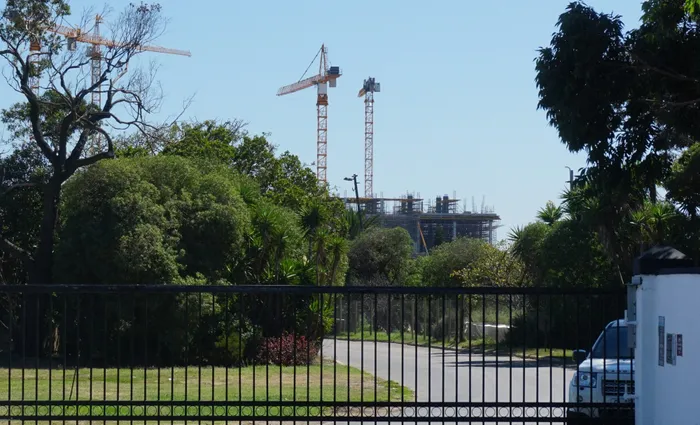Public interest benefits should be considered argues lawyer in River Club construction appeal

The Liesbeek Leisure Properties Trust has confirmed that construction on the River Club development has continued. Picture:Ian Landsberg/African News Agency (ANA).
Cape Town - Tauriq Jenkins and indigenous elders were left whistling in the wind at the conclusion of the two-day appeal hearing in the Western Cape High Court, when Judge Elizabeth Baartman respectfully said they were not allowed to make any submissions without legal representation.
This, after advocate Anton Katz (SC) for Goringhaicona Khoi Khoin Indigenous Traditional Council (GKKITC) on Wednesday described Jenkins’ oral arguments as “legally uninteresting”.
On Tuesday, a rescission application which would effectively nullify the GKKITC’s role in litigation was opposed by Jenkins, but Katz showed no mercy, stating that no matter how “clever” Jenkins was, he was not in a position to legally represent anyone.
“Only Mr (Tim) Dunn in this case as a lawyer can legally represent GKKITC in this case,” Katz said.
The full bench sitting is a result of the Liesbeek Leisure Properties Trust (LLPT), the Province, the City and the Western Cape First Nation Collective’s (WCFNC) legal action at Supreme Court of Appeal (SCA) to have the matter heard on appeal.
On Wednesday it was revealed in court that Observatory Civic Association (OCA) had withdrawn their opposition to the appeal. They cited finances as a reason for their withdrawal, wanting to save on legal costs for the review application.
In March, Deputy Judge President Patricia Goliath made an order that construction at the R4.5 billion River Club development be halted, pending meaningful engagement and the outcome of a review application – which has been delayed by subsequent litigation, challenging the order.
The review deals with the heritage impact assessment (HIA) and authorisation of the development which OCA believes were not compliant with the National Environmental Management Act (Nema) and the National Heritage Resources Act.
They were successful in establishing that there was a prima facie right to review decisions made by the provincial government for the development to go ahead on the grounds that they were unlawful.
Yesterday the City, the province, the developers and the WCFNC argued why the conclusion reached by Judge Goliath in granting the interim order (in favour of OCA and GKKITC) did not meet the requirements in law.
The City’s lawyer, Ron Paschke (SC), argued that the appeal court must weigh up the benefits of the development in light of the public’s interest.
He said the right to heritage was not in dispute, but whether irreparable harm was being done to that right, in the construction of the development, had to be considered.
Paschke said the City’s position on the development was that it was assisting in protecting the tangible and intangible heritage resources of first nations groups, by enlisting the help of a private developer to enrich the space which had previously been dilapidated and neglected.
He said the court should weigh whether the benefits of economic growth, affordable housing and the enhanced biodiversity would be harming the historical memory indigenous groups attach to that area – which in its current state had nothing “tangible” to preserve.
“When one has a development of this scale, it has regenerative points to kick-start the economy by promoting other development.”
Ismail Jamie (SC) for the WCFNC said that the remedy for the issue was in the ongoing consultation between indigenous groups and the developer.
Judgment is reserved for now but Judge Baartman assured the court including indigenous elders that it would be deliberated "sooner rather than later".
rafieka.williams@inl.co.za